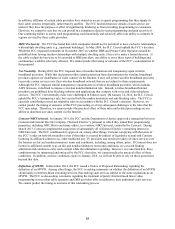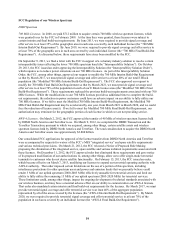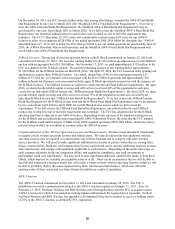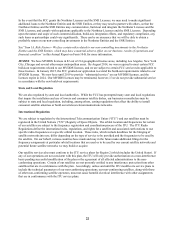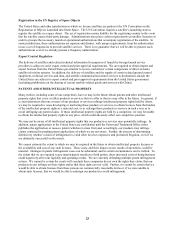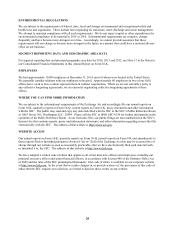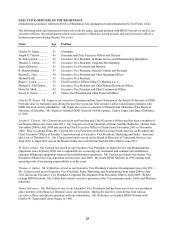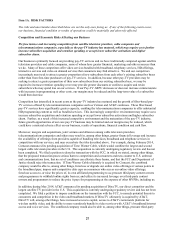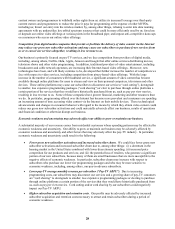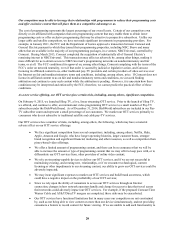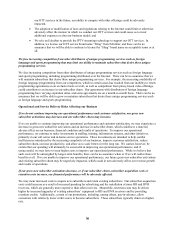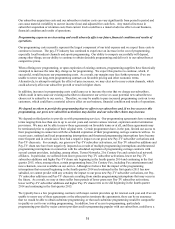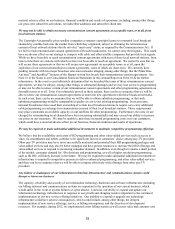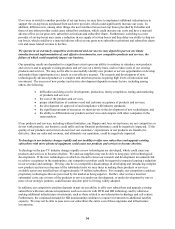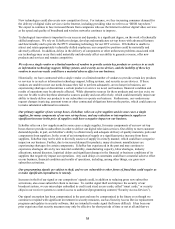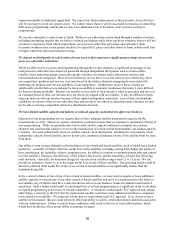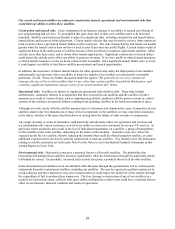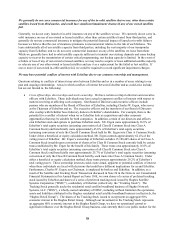Dish Network 2014 Annual Report Download - page 38
Download and view the complete annual report
Please find page 38 of the 2014 Dish Network annual report below. You can navigate through the pages in the report by either clicking on the pages listed below, or by using the keyword search tool below to find specific information within the annual report.28
28
content owners and programmers to withhold online rights from us; utilize its increased leverage over third-party
content owners and programmers to reduce the price it pays for programming at the expense of other MVPDs,
including us; thwart our entry into the wireless market, by, among other things, refusing to enter into data roaming
agreements with us; underutilize key orbital spectrum resources that could be more efficiently used by us; foreclose
or degrade our online video offerings at various points in the broadband pipe; and impose anti-competitive data caps
on consumers who access our online video offerings.
Competition from digital media companies that provide or facilitate the delivery of video content via the Internet
may reduce our gross new subscriber activations and may cause our subscribers to purchase fewer services from
us or to cancel our services altogether, resulting in less revenue to us.
Our business is primarily focused on pay-TV services, and we face competition from providers of digital media,
including, among others, Netflix, Hulu, Apple, Amazon and Google that offer online services distributing movies,
television shows and other video programming. In addition, traditional providers of video entertainment, including
broadcasters and cable network operators, are increasing their Internet-based video offerings. Moreover, new
technologies have been, and will likely continue to be, developed that further increase the number of competitors we
face with respect to video services, including competition from piracy-based video offerings. With the large
increase in the number of consumers with broadband service, a significant amount of video content has become
available through online platforms for users to stream and view on their personal computers, televisions and other
devices. These online platforms may cause our subscribers to disconnect our services (“cord cutting”), downgrade
to smaller, less expensive programming packages (“cord shaving”) or elect to purchase through online platforms a
certain portion of the services that they would have historically purchased from us, such as pay per view movies,
resulting in less revenue to us. Some of these companies have greater financial, marketing and other resources than
we do. In particular, programming offered over the Internet has become more prevalent and consumers are spending
an increasing amount of time accessing video content via the Internet on their mobile devices. These technological
advancements and changes in consumer behavior with regard to the means by which they obtain video content could
reduce our gross new subscriber activations and could materially adversely affect our business, results of operations
and financial condition or otherwise disrupt our business.
Economic weakness and uncertainty may adversely affect our ability to grow or maintain our business.
A substantial majority of our revenue comes from residential customers whose spending patterns may be affected by
economic weakness and uncertainty. Our ability to grow or maintain our business may be adversely affected by
economic weakness and uncertainty and other factors that may adversely affect the pay-TV industry. In particular,
economic weakness and uncertainty could result in the following:
Fewer gross new subscriber activations and increased subscriber churn. We could face fewer gross new
subscriber activations and increased subscriber churn due to, among other things: (i) a downturn in the
housing market in the United States combined with lower discretionary spending; (ii) increased price
competition for our products and services; and (iii) the potential loss of retailers, who generate a significant
portion of our new subscribers, because many of them are small businesses that are more susceptible to the
negative effects of economic weakness. In particular, subscriber churn may increase with respect to
subscribers who purchase our lower tier programming packages and who may be more sensitive to
economic weakness, including, among others, our pay-in-advance subscribers.
Lower pay-TV average monthly revenue per subscriber (“Pay-TV ARPU”). Due to increasing
programming costs, our subscribers may disconnect our services and a growing share of pay-TV customers
are “cord shaving” to downgrade to smaller, less expensive programming packages or electing to purchase
through online platforms a certain portion of the services that they would have historically purchased from
us, such as pay per view movies. Cord cutting and/or cord shaving by our subscribers could negatively
impact our Pay-TV ARPU.
Higher subscriber acquisition and retention costs. Our profits may be adversely affected by increased
subscriber acquisition and retention costs necessary to attract and retain subscribers during a period of
economic weakness.


